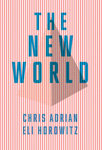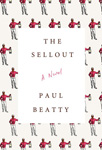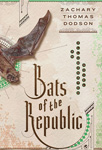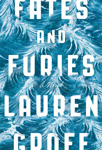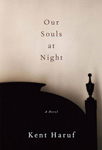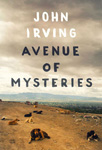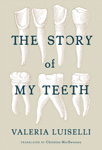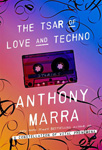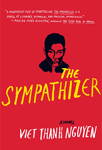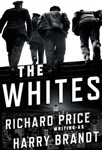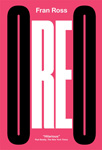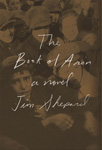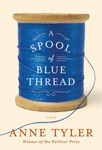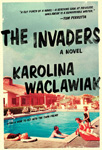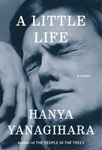by Chris Adrian and Eli Horowitz
Buy it at Powell’s »Brad Listi: I’d like to start by saying that I’m a man of questionable morality, prone to faulty logic, operatic self-pity, and annihilating guilt. I’m also profoundly ill-suited to judge anything, let alone art, with any kind of authority.
My initial plan, devised before I even started reading, was to advance Viet Thanh Nguyen’s The Sympathizer and kick Fran Ross’s Oreo to the curb because, well, Ross is dead, and Nguyen is still alive.
The logic here is simple: Ross won’t have her feelings hurt by losing. I can do the least amount of harm if I simply advance The Sympathizer, an elaborately drawn, tragicomic spy thriller, while letting Oreo, a bitingly funny, whip-smart cultural satire, fend for itself in the unforgiving wilds of the literary marketplace.
But that would be too easy.
The more that I considered my plan, the more I began to fear the ghost of Fran Ross and how she might curse me from The Great Beyond if I failed to give her a fair shake, because I’m the kind of atheist who believes in ghosts and curses. Oreo is the only novel Ross ever published. The book appeared in 1974, and then, for the most part, disappeared, and wouldn’t be resuscitated and properly appreciated until later, long after Ross’s death from cancer in 1985. She was only 50.
“Oreo” in Oreo is a racial designation and the nickname of Christine, a half-black, half-Jewish girl raised by her maternal grandparents in Philadelphia. Her mother, Helen, is mostly absentee and travels the country with a theatrical troupe. Her father is totally absentee, a white Jew named Samuel Schwartz who disappeared into Manhattan years ago. Oreo sets out in search of him. Her story, inspired by the Greek myth of Theseus and his journey into the Labyrinth, is a deft exploration of, among other things, patriarchy, race, ethnicity, and gender. Here, for example, is Ross describing Oreo’s “system of self-defense,” which she conjures in response to the often bitter realities of being a woman in the world:
She called her system of self-defense the Way of the Interstitial Thrust, or WIT … [and] developed a series of moves that made other methods of self-defense—jiu-jitsu, karate, kung fu, savage, judo, aikido, mikado, kikuyu, kendo, condo, and shlong—obsolete by incorporating and improving upon their most effective aspects … Whether he was big or small, fat or thin, well-built or spavined, Oreo could, when she was in a state of extreme concentration known as hwip-as, engage any opponent up to three times her size and whip his natural ass.
This is an outrageous and wise novel about the absurdity of identity, the bottomless quest for self. It paints a portrait that, in the context of the ’70s, was totally foreign to most readers, but which has become, thank goodness, in the intervening years, increasingly more familiar (though is sadly still alien to some). Another way of putting it: Oreo was, and in many ways remains, a good deal ahead of its time. I really enjoyed reading it and often found myself smiling as I went, but feel compelled to note that I never laughed out loud. I almost never laugh aloud while reading, but on the rare occasions that I do, I tend to feel really enthused, and also jealous, especially when the laughter is “wincing laughter,” as this is the experience I most crave from art. These are the books that I will often read a second, or even third time, and will recommend to friends, and so on. I should also confess that I often found myself lost as I read this novel, confused about characters and the details of Oreo’s family tree. Several times, I had to flip back to previous chapters to keep track of names and relations, and to reorient myself in the plot. This could be because the book is confusing and sloppily written, or else it could mean that I’m easily confused. The latter, let’s be honest, seems more likely.
Viet Thanh Nguyen’s The Sympathizer, while covering vastly different terrain, shares many of Oreo’s thematic concerns. It, too, is a novel about identity and duality set in the 1970s, its anonymous narrator split in almost every conceivable way: a peasant born to a Vietnamese mother and a white French priest; who is a spy for the North, deeply embedded in the South; who is a Communist with an American education and friends on both sides of the line. In the aftermath of the war, he ends up in Los Angeles where, as a refugee, he continues his work as a spook, observing the diaspora and milking his boss, “the General,” for intelligence. And that’s just the start of it.
Certain sections of The Sympathizer felt over-long to me, and some of the jokes didn’t really land. The narrator’s voice, while consistent throughout, is almost unbelievably mannered, to the point where I kept imagining the book being written first in Vietnamese and then translated into English, which might, I told myself, at least to some degree, deliver this kind of effect. It later occurred to me that this might be exactly what Nguyen intended, as his narrator is Vietnamese and would almost certainly, in his confession, be writing in his native tongue, in which case the mannered-ness seems more impressive and, from a cross-cultural perspective, believable.
The Sympathizer is a sprawling, intricately plotted novel that dismantles, often with acid humor, many of the familiar Western tropes about Vietnamese culture and the war. At one point the narrator goes to the Philippines to work as an adviser on the set of a movie that is clearly modeled on Apocalypse Now (its director, “the Auteur,” an obvious stand-in for Francis Ford Coppola). And in one of the book’s better sequences, the narrator accompanies the General to a country club, where at the table of a famous author (the unsubtly named Richard Hedd) and some other local dignitaries, he delivers this cutting assessment:
As a nonwhite person, the General, like myself, knew he must be patient with white people, who were easily scared by the nonwhite. Even with liberal white people, one could only go so far, and with average white people one could barely go anywhere … We were the greatest anthropologists ever of the American people, which the American people never knew because our field notes were written in our own language in letters and postcards dispatched to our countries of origin, where our relatives read our reports with hilarity, confusion, and awe.
And speaking of confusion and awe, I now find myself saddled with the unenviable task of having to weigh these two fine books against one another, and, in accordance with the dictates of this hideous contest, pick a winner. Fran Ross, God rest your soul, I admire your fearless humor and obvious love of language and the world you made on the page, but in the end I’ve gotta give this one to Viet Thanh Nguyen and The Sympathizer, on the grounds that a) the man is still alive, and lives in my hometown of Los Angeles, and could feasibly come after me if I deny him the victory; and b) because his novel, grand in scope and steeped in history, seems like an unusually heavy lift. Hats off to both writers. And congratulations to The Sympathizer. It advances.
Match Commentary
By Kevin Guilfoile & John Warner
Kevin: John, The Sympathizer was recently nominated for an Edgar Award in the category Best First Novel. The Edgars are, of course, the awards given out each year by the Mystery Writers of America (a group I am a proud member of). But this has me thinking, as it no doubt has you, about Rooster/Edgar crossover trivia! And bear with me because I think this is kind of interesting.
What three Edgar-winning authors (in a novel category) also have been shortlisted for the ToB?
I know immediately what you are thinking: Gillian Flynn has got to be one. You would be wrong. Gillian received Edgar nominations for both Gone Girl and for her first novel, Sharp Objects, but surprisingly she lost both times (Gone Girl was defeated in the 2013 ToB by Zombie The Orphan Master’s Son, and lost the Edgar to Dennis Lehane’s Live By Night). Gillian did win an Edgar for Best Short Story last year.
Because I know you are a big fan (as I am) of the Jackson Brodie mysteries, your next guess will be Kate Atkinson, who has been a ToB competitor twice, and whose Life After Life made it all the way to the finals in 2014. But you would be wrong again! Kate Atkinson, unbelievably, has never even been nominated for an Edgar.
John: Well, that just seems kind of wrong. Get on the stick, Edgars.
Kevin: Indeed. Now I grok your mind almost as well as my own, so your next guess will no doubt be Laura Lippman. And you would be right. Nice job! Laura’s novels have been nominated five times for Edgars, and she won in 1998 for the excellent Charm City. She was shortlisted for the ToB in 2008 for What the Dead Know.
And wait! You will say. Just this year the great crime writer Richard Price is on the ToB shortlist. Surely Price has won an Edgar. That’s an excellent guess and you would be correct that Price has won an Edgar, but not for any of his novels. He won as part of the impressive stable of writers who worked on The Wire. He was also nominated for his screenplay for the Al Pacino film Sea of Love (which lost to Heathers). However, he has never been nominated as a novelist.
John: I realize I actually do know one of these. Jess Walter won the Edgar for his first novel Citizen Vince.
Kevin: Excellent! Walter ran for the Rooster a few years later with Beautiful Ruins. That is not an obvious one.
The third and final one is even trickier. Who, John, who is the third writer? And no Googling.
John: It’s much easier to think of past competitors who are plausible contenders for the Hugo Awards, including The Road and last year’s Station Eleven. Just like I’ve been trained by my years of shouting at the television during Jeopardy, I’m going to trust my gut and say Herman Koch’s The Dinner.
Tell me I’m wrong.
Kevin: You’re wrong! In fact, the only other novelist who has been shortlisted for the Rooster and who has also won the Edgar is John Green. The Fault in Our Stars, of course, made it to the ToB finals (losing to The Orphan Master’s Son), but John had even better luck with the Edgars. Paper Towns (which might be my favorite John Green novel, incidentally) won the Edgar for best YA Mystery Novel in 2009, despite being, well, not really a mystery/crime novel, as it’s traditionally defined.
Neither is The Sympathizer, though, so I guess that’s my point.
There is killing in The Sympathizer, and at least two murders—or assassinations at any rate. Beyond that it probably shares little in common with its fellow Edgar nominees, and for that I say good for the MWA.
John: I think it’s only just for the MWA to lay claim to so-called “literary” fiction for itself when the literary crowd is only too eager to snap up genre work, but then go about erasing those genre origins, as though someone calling a genre novel literature cleanses it of any unsavory stank of the proles.
To discuss why I actually think that The Sympathizer could plausibly be categorized as a mystery would be to spoil multiple threads of plot, but let me say that I can see where the MWA is coming from.
Kevin: For sure. But there’s a lot about it that is unconventional. For a novel that could also be genrefied as “historical fiction,” and which is set during one of the most interesting periods of the 20th century, there is shockingly little interest in time and place. Nguyen spends so few words on the setting that, except for the fact of this character being a North Vietnamese spy who gets out of town during the fall of Saigon, it would be impossible for a reader to get her Tardis bearings from Nguyen’s description. (I think there might be a reference to James Taylor and Donna Summer in a single sentence, somewhere in the middle second half.) It’s a decision that feels curious as you’re reading, but because Nguyen’s targets are at least as contemporary as they are historical, timelessness makes a wonderful kind of sense.
There is an assuredness on every page. The Apocalypse Now section is very funny. The Dostoevskian (Dostoevsque?) interlude set at an American country club is a showstopper. The ending, despite the confession format (which forfeits many opportunities for suspense), still surprises. It’s impressive.
John: Brad Listi, one of the nation’s leading literary interview podcasters, proves himself an adroit judge, and also outs himself as a non-believer in ghosts as he appears to fear the corporeal Viet Thanh Nguyen to the spectral Fran Ross.
The Sympathizer is a massively accomplished novel, and that it’s a first novel is stunning and humbling. I’m glad we’ll have it to talk about going forward, but because it’s staying at the party, I’ll stop there and instead sing the praises of Oreo in the hopes that more people will seek out this amazing book.
My first contact with Oreo was through ToB competitor Paul Beatty, who included an excerpt of it in Hokum: An Anthology of African American Humor. I used the volume in a course I taught and was knocked over by the sui generis brilliance of Ross’s voice, and the sheer energy behind her humor. The book was published in 1974 and yet it has no trouble hanging in a contest of contemporary literature.
Either it was way ahead of its time, or Ross tapped into some of the persistent and devastating realities of what is to live in the world as a minority woman. (I’m going to say it’s both of those things.)
And it’s so, so clever and funny. For me, the best satires serve to diagnose the things that ail our culture, and Oreo is just bang-on. The only satire I’ve read in the last decade that does it any better happens to be Paul Beatty’s The Sellout.
Tomorrow, you and I get to take a break as Christopher Hermelin and Drew Broussard, the co-hosts of So Many Damn Books (the semi-official podcast of the ToB) enter the booth to weigh in on The Turner House versus Ban en Banlieue. It’s the takeover of the superfans, and we couldn’t really be happier about it.

The official 2016 Tournament of Books T-Shirt by book designer Janet Hansen. Order yours!


